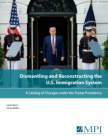Legalization/Regularization
Recent Activity
Recent Activity
Ecuador se ha convertido en un destino importante para los migrantes sudamericanos, un país de tránsito para quienes se dirigen al norte y una fuente renovada de emigración. El pequeño país andino se ha visto enredado en las tendencias cambiantes de movilidad de la región y ha respondido a las circunstancias cambiantes con una combinación de políticas que ha producido algunos resultados imprevistos.
El desplazamiento de venezolanos ha llevado a países de toda América Latina y el Caribe a poner en marcha políticas y programas para registrar, regularizar y apoyar la integración de los venezolanos. Sin embargo, la medida en que la regularización ha ayudado a los venezolanos a encontrar trabajo ha variado de un país a otro, como se analiza en este informe.





















As Europe and the United States Face Similar Migration Challenges, Spain Can Act as a Bridge
Spain and the United States both receive their greatest number of immigrants from Latin America, and have worked collaboratively together on displacement crises and other migration issues. As shared immigration challenges dominate debate on both sides of the Atlantic, Spain can serve as a vital bridge in the policy conversation, this commentary notes.